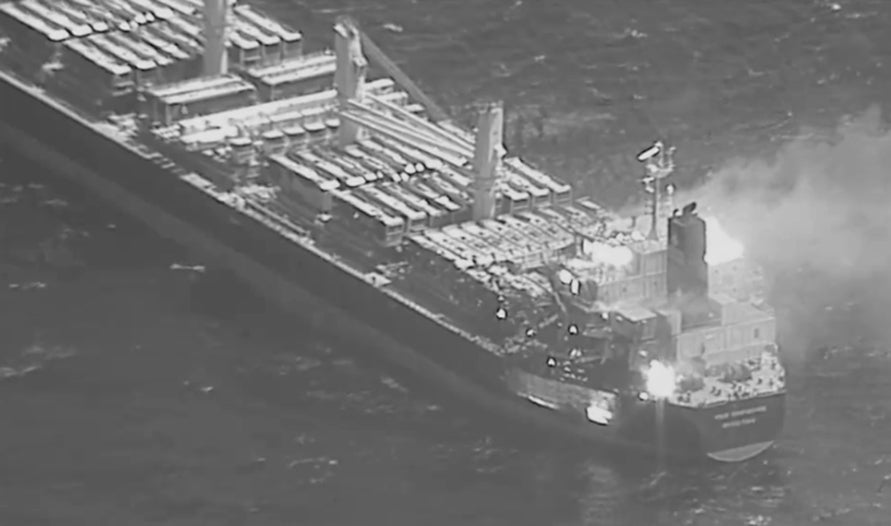UN envoy warns Gaza war and Red Sea attacks by Houthi rebels risk propelling Yemen back into war
The longer the war in Gaza goes on and Yemen’s Houthi rebels keep attacking ships in the Red Sea the greater the risk that Yemen could be propelled back into war, the U.N. special envoy for the Arab world's poorest country is warning

The longer the war in Gaza goes on and Yemen’s Houthi rebels keep attacking ships in the Red Sea the greater the risk that Yemen could be propelled back into war, the U.N. special envoy for the poorest Arab nation warned Thursday.
Hans Grundberg told the U.N. Security Council it has been impossible to shield his promising efforts to restore peace to Yemen because the reality is, “what happens regionally impacts Yemen – and what happens in Yemen can impact the region.”
Since November, the Iranian-backed Houthis have targeted ships in the Red Sea to demand a cease-fire in Israel’s offensive in Gaza. It began after Gaza’s Hamas rulers launched a surprise attack in southern Israel on Oct. 7 that killed about 1,200 people and led to about 250 others being taken captive. Israel's ongoing military operation has killed more than 31,000 Palestinians, according to the Gaza health ministry.
The Houthi attacks targeting vessels since November, however, have increasingly had little or no connection to Israel, the United States or other nations involved in the war. In the first fatal strike, a Houthi missile struck a commercial ship in the Gulf of Aden last week, killing three of its crew members and forcing survivors to abandon the vessel.
The war between the Houthis and pro-government forces backed by a coalition of Gulf Arab states has raged since 2014 when the Houthis swept down from the mountains, seized much of northern Yemen and the country’s capital, Sanaa, and forced the internationally recognized government to flee into exile to Saudi Arabia. Since then, more than 150,000 people have been killed by the violence and 3 million have been displaced.
Fighting has decreased markedly in Yemen since a truce in April 2022, but there are still hotspots in the country.
Grundberg, who has been trying to mediate a cease-fire and launch a political process, told the council that the U.N. had hoped, “and Yemenis had expected,” that by the Muslim holy month of Ramadan, which began several days ago, “we would have had an agreement on a nationwide cease-fire and measures to improve living conditions in Yemen.”
The U.N. envoy said he also had hoped to be briefing council members about preparations “for an inclusive political process.”
But with the ongoing Gaza War and continuing Houthi attacks, he warned the council that “the longer the escalatory environment continues, the more challenging Yemen’s mediation space will become.”
“With more interests at play, the parties to the conflict in Yemen are more likely to shift calculations and alter their negotiation agendas,” he said. “In a worst-case scenario, the parties could decide to engage in risky military adventurism that propels Yemen back into a new cycle of war.”
Edem Wosornu, the U.N. humanitarian office’s operations director, said positive progress in Yemen after the U.N.-brokered truce in 2022 is now “at risk of unraveling.”
“Levels of food insecurity and malnutrition have surged in recent months, posing a real and increasing threat to the lives and well-being of millions of people, particularly women and children,” she said.
Wosornu pointed to an 11% increase in food insecurity since last November in assessments by the U.N. children’s agency UNICEF and the U.N. World Food Program that food insecurity in Yemen has increased by 11% since last November.
That assessment also found that nearly half of all children in Yemen under the age of five are experiencing moderate to severe stunting in growth and development – a 4% increase since 2022, “and more than double the global stunting prevalence,” she said.
Because of a lack of funds, the World Food Program has cut the number of people receiving aid in government-controlled areas and the size of rations, Wosornu said. In Houthi-controlled areas, WFP suspended food assistance to 9.5 million people in November while it continued discussions on who to prioritize for aid.
Agreement has been reached on “a pilot retargeting exercise” in Houthi areas, and if it succeeds, she said a broader resumption of food distribution will take place depending on available funding.
WFP is appealing for $230 million over the next five months to provide food for the most vulnerable families in Houthi-controlled areas and Wosornu urged donors to step up.
Bookmark popover
Removed from bookmarks